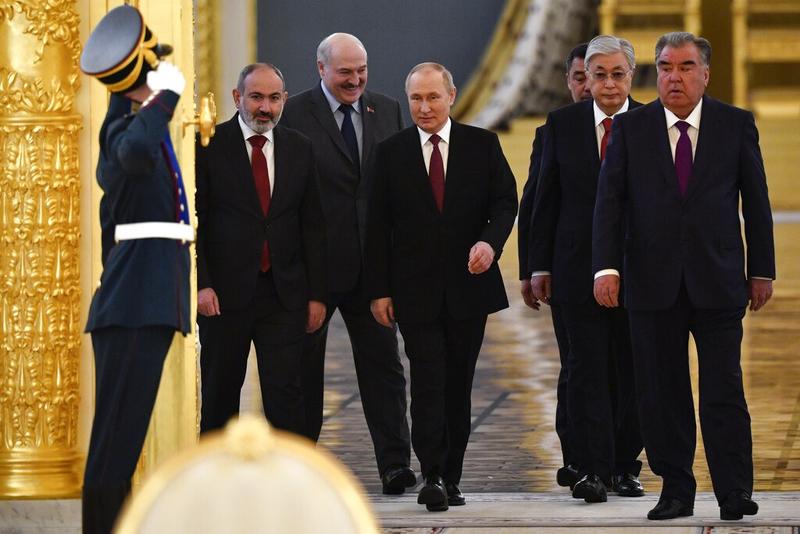 Leaders of the Collective Security Treaty Organization member states gather for a summit at the Kremlin in Moscow on Monday. (ALEXANDER NEMENOV / POOL PHOTO VIA AP)
Leaders of the Collective Security Treaty Organization member states gather for a summit at the Kremlin in Moscow on Monday. (ALEXANDER NEMENOV / POOL PHOTO VIA AP)
The European Union has been unable to agree on further sanctions against Russia as a small group of countries oppose or are uneasy about enacting an oil embargo in response to the conflict in Ukraine.
The EU's High Representative for Foreign Affairs and Security Policy Josep Borrell said at a news conference on Monday that unanimity had not been reached on the issue after the meeting of the EU Foreign Affairs Council in Brussels.
EU foreign ministers were discussing a proposal by the European Commission for a sixth package of sanctions, including a ban on Russia oil. The proposed sanctions require unanimous support from the EU member states.
Slovakia and the Czech Republic are among the member states that have concerns and Hungary opposes the embargo, reported Euronews, which noted that the main point of contention is the ambitious timeline for an EU-wide ban.
Lithuanian Foreign Minister Gabrielius Landsbergis told reporters in Brussels that sanctions were being obstructed by just one of the bloc's 27 members.
Reuters cited EU diplomats as saying the country he was referring to is Hungary, which continues to oppose the oil embargo, despite being offered an extension on phasing out Russian crude until the end of 2024.
In a social media post last week, Hungarian Foreign Minister Peter Szijjarto said the government of Prime Minister Viktor Orban needed "hundreds of millions of dollars" for Hungarian refineries, a capacity increase for a Croatian pipeline and compensation for the Hungarian economy.
An oil embargo on Russia has been implemented by the United States and the United Kingdom.
Borrell said that the EU will continue to impose sanctions on Russia, but it was not possible to predict how long it could take to reach a deal.
Austrian Foreign Minister Alexander Schallenberg told reporters that he expects the EU sanctions will be approved in the coming days.
Other EU diplomats quoted by Reuters said an agreement on a phased ban on Russian oil would more likely be reached at a May 30-31 summit. It said the phaseout would probably be extended over six months, with a longer transition period for Hungary, Slovakia and the Czech Republic.
Although the Russia-Ukraine conflict continues, the Collective Security Treaty Organization reaffirmed its willingness to establish pragmatic cooperation with the North Atlantic Treaty Organization and build lasting peace in the Eurasian region in a joint statement issued on Monday.
"Realizing our responsibility for ensuring lasting peace in the Eurasian region, we emphasize the importance of reducing tensions on the continent and reaffirm our readiness to establish practical cooperation with NATO," said the statement issued on the occasion of the 30th anniversary of the Collective Security Treaty and the 20th anniversary of the CSTO.
"The CSTO, which was established in 2002… has accumulated significant potential to counter a wide range of modern challenges and threats, and has become an important contributor to peace and stability in the Eurasian space," said the statement.
"We confirm that the organization will continue to ensure the security, sovereignty and territorial integrity of its member states, work to strengthen global and regional security, and continue to settle international problems on the basis of universally recognized norms and principles of international law," it added.
The statement was issued following a summit of the leaders of the CSTO in Moscow.
At the summit, Russian President Vladimir Putin said on Monday that Moscow would respond if NATO would deploy military infrastructure on the territories of Finland or Sweden.
Putin added that the issue of NATO enlargement is largely artificial, and is being used by the US as a foreign policy tool.
Chen Yingqun in Beijing and Xinhua contributed to this story.
jonathan@mail.chinadailyuk.com


